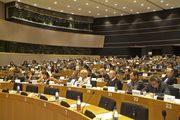 Romania will have an election for the European Parliament (EP) later this autumn but not only are there few candidates prepared to stand, a lot of the population seems to be unaware of the election.
Romania will have an election for the European Parliament (EP) later this autumn but not only are there few candidates prepared to stand, a lot of the population seems to be unaware of the election.
As part of their EU accession obligations, both Bulgaria and Romania must hold EP elections this year. Bulgaria did so in March and the Romanian election will take place on 26 November.
It can be assumed that very few EU citizens are aware of this election, but it is surprising how uninformed the Romanian public are; how few even know about this election – which is only two months away – and how little debate there is in the media. This is despite the fact that a big majority of Romanians were strongly in favour of EU accession.
The most curious thing about this election is how Romanian political parties seem to be facing real difficulties in finding candidates who are willing to stand, as well as the absence of any kind of election campaign.
None of Romania’s main political parties have come up with a finalised list of candidates, and many “names” drop out as soon as they are announced.
To put this into context, Romanian elections are usually a frenzy of lively televised debates; floods of posters, leaflets, ads and volunteers in T-shirts; hurried visits to the villages with bags of flour and promises to peasants – and epic struggles within the parties to get onto the official list of candidates.
These difficulties with finding candidates – an issue that could have been resolved months ago – is about the only “news story” that the Romanian media can publish on this issue. The usual plethora of issues surrounding an election are simply not forthcoming.
Of the numerous candidates that have been discussed and trumpeted in the Romanian media, three stand out: Vasile Danca, a respected sociologist from Cluj, current MEP in the socialist group and former minister of information; Mihai Ungureanu, the former Minister of Foreign Affairs; and Nadia Comaneci, winner of the gold medal in gymnastics at the 1976 Olympics in Montreal.
All three were announced by the media as being promising European parliament candidates – and all three subsequently withdrew their names.
Judging by the tone of the statements being reported by the Romanian press, this search for EP candidates is unwelcome work. It is becoming clear that politicians in Romania feel unwilling to depart from the epicentre of Romanian politics – Bucharest – despite the attractive salary that a euro-deputy commands. Going to Brussels seems not to be considered an appropriate route up the political ladder.
According to Mihail Virtosu, co-founder of the International Advertisers Association in Romania, this European Parliament election is “a unique opportunity for Romania’s political parties to put aside their internal political fights and approach the European agenda. This is the moment that society has been waiting for.”
But it seems certain that this approach will result in a low turnout at the election, perhaps even as low as Slovakia where only 17% of the population went to vote in 2004.
Krzysztof Bobinski, a candidate during the 2004 European election in Poland, says that it was only the extremist parties that were able to really motivate people to vote in his country.
“Poland’s example shows that a low turnout in the European elections means that a country is represented by a large number of extremist politicians and this is not good for its image. The main thing is that as many people as possible take part in these elections.”
This article was also published in the EUObserver.
Hi all!
Tell please where it is possible to find articles or news on the given theme.
G’night
REPLY; A COUPLE OF THE ROMANIAN NEWSPAPERS WRITE ABOUT THIS: ADEVARUL IN PARTICULAR, BUT THEY ARE IN ROMANIAN LANGAUGE ONLY
Hello
I was very much helped by the information with this article.
Many thanks at you very fascinating resource. uitm student portal
acs student loan consolidation cfs student loan consolidation
student loan forgiveness
citibank student loan consolidation
G’night